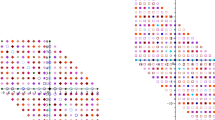Abstract
The problem of computing the greatest common divisor (GCD) of multivariate polynomials, as one of the most important tasks of computer algebra and symbolic computation in more general scope, has been studied extensively since the beginning of the interdisciplinary of mathematics with computer science. For many real applications such as digital image restoration and enhancement, robust control theory of nonlinear systems, L1-norm convex optimization in compressed sensing techniques, as well as algebraic decoding of Reed-Solomon and BCH codes, the concept of sparse GCD plays a core role where only the greatest common divisors with much fewer terms than the original polynomials are of interest due to the nature of problems or data structures. This paper presents two methods via multivariate polynomial interpolation which are based on the variation of Zippel’s method and Ben-Or/Tiwari algorithm, respectively. To reduce computational complexity, probabilistic techniques and randomization are employed to deal with univariate GCD computation and univariate polynomial interpolation. The authors demonstrate the practical performance of our algorithms on a significant body of examples. The implemented experiment illustrates that our algorithms are efficient for a quite wide range of input.
Similar content being viewed by others
References
Brown W S, On Euclid’s algorithm and the computation of polynomial greatest common divisors, Journal of the ACM, 1971, 18(4): 478–504.
Brown W S and Traub J F, On Euclid’s algorithm and the theory of subresultants, Journal of the ACM, 1971, 18(4): 505–514.
Collins G E, Subresultants and reduced polynomial remainder sequences, Journal of the ACM, 1967, 14(1): 128–142.
Hoeij M V and Monagan M, Algorithms for polynomial GCD computation over algebraic function fields, Proceedings of Symbolic and Algebraic Computation, International Symposium ISSAC 2004, Santander, 2004, 297–304.
Javadi S M M and Monagan M, A sparse modular gcd algorithm for polynomials over algebraic function fields, Proceedings of the 2007 International Symposium on Symbolic and Algebraic Computation, Canada, 2007, 187–194.
Qiu W Z and Skafidas E, Robust estimation of GCD with sparse coefficients, Signal Processing, 2010, 90: 972–976.
Candès E J, Mathematics of sparsity (and a few other things), Proceedings of the International Congress of Mathematicians, Seoul, 2014.
Char B W and Geddes K O and Gonnet G H, GCDHEU: Heuristic polynomial GCD algorithm based on integer GCD computation, Proceedings of International Symposium on Symbolic and Algebraic Computation Cambridge, England, 1984, 285–296.
Moses J and Yun D Y Y, The EZGCD algorithm, Proceedings of ACM Annual Conference, Munich, 1973, 159–166.
Musser D R, Multivariate polynomial factoring, Journal of the ACM, 2009, 22(2): 291–308.
Wang P S and Rothschild L P, Factoring multivariate polynomials over the integers, Mathematics of Computation, 1975, 29(131): 935–950.
Zassenhaus H, On Hensel factorization I, Journal of Number Theory, 1969, 1(3): 291–311.
Javadi S M M and Monagan M, A sparse modular gcd algorithm for polynomials over algebraic function fields, Proceedings of the 2007 International Symposium on Symbolic and Algebraic Computation, Canada, 2007, 187–194.
Zippel R, Probabilistic algorithms for sparse polynomials, Lecture Notes in Computer Science, 1979, 72: 216–226.
De Kleine J, Monagan M, and Wittkopf A, Algorithms for the non-monic case of the sparse modular GCD algorithm, Proceedings of the 2005 International Symposium on Symbolic and Algebraic Computation, Beijing, 2005, 124–131.
Ben-Or M and Tiwari P, A deterministic algorithm for sparse multivariate polynomial interpolation, Proceedings of the 20th Annual ACM Symposium on Theory of Computing, New York, 1988, 301–309.
Bright C and Storjohann A, Vector rational number reconstruction, Proceedings of the 36th International Symposium on Symbolic and Algebraic Computation, San Jose, California, 2011, 51–58.
Hoeij M V and Novocin A, Gradual sub-lattice reduction and a new complexity for factoring polynomials, Theoretical Informatics, 6034 of Lecture Notes in Computer Science, 2010, 539–553.
Wang P S, The EEZ-GCD algorithm, SIGSAM Bull, 1980, 14(2): 50–60.
Cuyt A and Lee W S, Sparse interpolation of multivariate rational functions, Theoretical Computer Science, 2011, 412(16): 1445–1456.
Grigoriev D Y and Karpinski M, The matching problem for bipartite graphs with polynomially bounded permanents is in NC, University of Bonn, 857-CS, 1986.
Acknowledgements
The authors are grateful to YANG Zhengfeng at East China Normal University. We would also like to thank anonymous reviewers for their very valuable comments.
Author information
Authors and Affiliations
Corresponding author
Additional information
This research was supported by the National Natural Science Foundation of China under Grant Nos. 11471209, 11561015, and 11301066, and Guangxi Key Laboratory of Cryptography and Information Security under Grant No. GCIS201615.
This paper was recommended for publication by Editor ZHANG Yang.
Rights and permissions
About this article
Cite this article
Tang, M., Li, B. & Zeng, Z. Computing Sparse GCD of Multivariate Polynomials via Polynomial Interpolation. J Syst Sci Complex 31, 552–568 (2018). https://doi.org/10.1007/s11424-017-6332-0
Received:
Revised:
Published:
Issue Date:
DOI: https://doi.org/10.1007/s11424-017-6332-0




